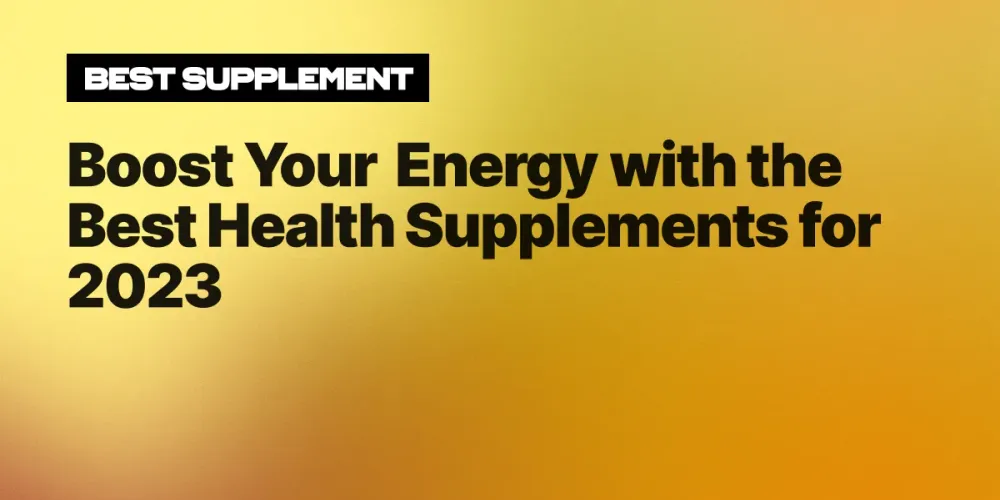Boost Your Energy with the Best Health Supplements for 2023
- July 12, 2023

Energy is a vital component of our daily lives. It fuels our physical and mental activities, allowing us to perform tasks, think clearly, and carry out our daily routines. Without sufficient energy, we may experience fatigue, lack of motivation, and difficulty concentrating.
Addressing Common Energy-related Challenges
Many individuals struggle with low energy levels and the associated challenges it brings. Busy schedules, stress, lack of sleep, and poor nutrition are some of the common factors that can contribute to decreased energy levels. Finding ways to address these challenges and improve energy levels is therefore essential for maintaining overall well-being.
Key Takeaways
- Energy is crucial for performing daily tasks and maintaining overall well-being.
- Common factors such as busy schedules, stress, lack of sleep, and poor nutrition can lead to low energy levels.
- Health supplements can provide an extra boost to energy levels and improve overall well-being.
The next section will delve into the science behind energy boosting, providing a deeper understanding of how energy is produced in the body and the role nutrients play in energy metabolism.
Understanding the Science behind Energy Boosting
Energy is an essential component of our daily lives, allowing us to carry out physical and mental activities effectively. To understand how to boost energy levels, it’s important to delve into the science behind energy production in the body and the factors that contribute to energy levels.
How Energy is Produced in the Body
Energy production in the body relies on a complex process called metabolism. Metabolism refers to the chemical reactions that occur within cells to convert nutrients into energy. The primary fuel source for energy production is glucose, which is obtained from carbohydrates in the diet.
During metabolism, glucose undergoes a series of chemical reactions in the cells, ultimately producing a molecule called adenosine triphosphate (ATP). ATP serves as the energy currency of the body, providing the necessary energy for various biological processes.
Factors That Contribute to Energy Levels
Several factors influence our energy levels. These include:
-
Nutrient Availability: Adequate intake of essential nutrients, such as vitamins, minerals, and macronutrients, is crucial for energy production. Nutrients like B vitamins, iron, and magnesium play vital roles in energy metabolism.
-
Hormonal Balance: Hormones, such as thyroid hormones and insulin, regulate the metabolism of nutrients and influence energy production. Imbalances in hormone levels can lead to decreased energy levels.
-
Mitochondrial Function: Mitochondria are the powerhouses of the cells responsible for energy production. Maintaining optimal mitochondrial function is essential for efficient energy production.
-
Physical Activity: Regular exercise and physical activity enhance energy metabolism and improve energy levels. Exercise stimulates the production of mitochondria and increases nutrient delivery to cells.
-
Sleep Quality: Adequate sleep is essential for energy restoration and optimal functioning of the body. Lack of sleep can lead to decreased energy levels and impaired metabolism.
Key Nutrients for Energy Boosting
To boost energy levels, it’s essential to incorporate key nutrients into your diet. Here are some important nutrients that play a crucial role in energy metabolism:
-
Vitamin B12: This essential vitamin is necessary for the formation of red blood cells and the proper functioning of the nervous system. It aids in the metabolism of carbohydrates and fats, thus supporting energy production.
-
Rhodiola Rosea: An herb known for its adaptogenic properties, Rhodiola Rosea has been traditionally used to combat fatigue and increase energy levels. It helps optimize the body’s response to stress and supports energy metabolism.
-
Iron: Iron is crucial for oxygen transport in the body and is an essential component of hemoglobin, a protein in red blood cells that carries oxygen. Adequate iron levels help maintain optimal energy levels.
-
Melatonin: Known as the sleep hormone, melatonin regulates the sleep-wake cycle. Adequate melatonin levels promote quality sleep, which is vital for energy restoration and overall well-being.
-
CoQ10: Coenzyme Q10 plays a critical role in the production of ATP, the energy currency of the cells. It helps convert nutrients into usable energy and protects cells from oxidative damage.
Incorporating these key nutrients into your diet can provide a natural boost to your energy levels. However, it’s important to consult with a healthcare professional before adding any new supplements to your routine to ensure they are safe and suitable for you.
Exploring Other Promising Supplements for Energy
In addition to the key nutrients mentioned earlier, there are other supplements that show promise in boosting energy levels. Let’s take a closer look at some of these supplements and their potential benefits:
-
Creatine: Creatine is a naturally occurring protein found in muscles. It is commonly used by athletes and individuals engaging in high-intensity workouts. While its main purpose is to improve muscle mass and performance, there is limited evidence to suggest that creatine can directly enhance energy levels or combat fatigue.
-
Coenzyme Q10 (CoQ10): CoQ10 is a substance produced by the body’s cells, which plays a role in growth and maintenance. It is also known for its antioxidant properties. While some individuals use CoQ10 to lower cholesterol or alleviate symptoms of certain illnesses, there is limited scientific evidence to support its effectiveness in improving energy levels or combating fatigue.
It’s important to note that the effectiveness and safety of these supplements may vary among individuals. Before incorporating any new supplement into your routine, it is advisable to consult with a healthcare professional to ensure it is safe and suitable for you.
Comparing Popular Brands and Products
When it comes to choosing the right supplement brand for energy, it’s important to consider factors such as quality, purity, and effectiveness. Here are some guidelines to help you make an informed decision:
-
How to Choose the Right Supplement Brand: Look for reputable brands that have a track record of producing high-quality supplements. Check for certifications, such as Good Manufacturing Practices (GMP), which ensure that the products are made in a clean and safe environment.
-
Evaluating the Quality and Purity of Supplements: Read product labels and look for supplements that contain pure and potent ingredients. Avoid supplements that contain unnecessary fillers, additives, or artificial ingredients. Look for third-party testing and verification to ensure the quality and purity of the products.
-
Recommended Products for Different Energy Needs: Consider your specific energy needs and look for supplements that address those needs. For example, if you’re looking for an energy boost during workouts, you may want to consider supplements that contain ingredients like caffeine, creatine, or citrulline. If you’re looking for long-lasting energy throughout the day, you may want to look for supplements that support overall energy metabolism, such as those containing B vitamins or CoQ10.
Remember, everyone’s energy needs and preferences may vary, so it’s essential to consult with a healthcare professional or a registered dietitian before choosing a specific supplement brand or product. They can provide personalized recommendations based on your individual needs and health goals.
Supplement Usage Instructions and Considerations
When it comes to using health supplements for energy, it’s important to follow proper usage instructions and consider certain factors. Here are some guidelines to keep in mind:
-
Proper Dosage and Timing for Maximum Effectiveness: Read the instructions on the supplement packaging carefully and follow the recommended dosage. Taking more than the recommended dosage can lead to adverse effects. In addition, consider the optimal timing for taking the supplement. Some supplements are best taken with meals, while others are more effective when taken on an empty stomach.
-
Possible Interactions and Side Effects to be Aware of: It’s important to be aware of any potential interactions or side effects associated with the supplement you’re taking. Certain supplements may interact with medications you’re currently taking or may have side effects such as gastrointestinal discomfort or allergic reactions. Consult with a healthcare professional or a registered dietitian to ensure the supplement is safe for you.
-
Precautions for Specific Groups (Pregnant Women, Children, etc.): Certain supplements may not be suitable for certain groups of individuals, such as pregnant women, children, or those with specific medical conditions. It’s important to consult with a healthcare professional before taking supplements to ensure they are safe for your specific circumstances.
Remember, health supplements should not be used as a substitute for a balanced diet and healthy lifestyle. They are meant to complement a well-rounded approach to overall well-being. If you have any concerns or questions about using health supplements, it’s always best to consult with a healthcare professional who can provide personalized advice.
Benefits and Drawbacks of Energy Supplements
When it comes to energy supplements, there are both potential benefits and drawbacks to consider. Let’s explore them in more detail:
Understanding the Potential Benefits
-
Increased Energy Levels: Energy supplements are specifically designed to provide a boost in energy. They can help combat fatigue and improve overall vitality, allowing you to tackle daily tasks with more vigor.
-
Enhanced Focus and Concentration: Certain supplements may improve mental clarity and cognitive function, helping you stay alert and focused throughout the day.
-
Improved Exercise Performance: Some energy supplements, such as those containing creatine or citrulline, can enhance athletic performance by increasing energy levels, improving endurance, and supporting muscle function.
-
Support for Energy Metabolism: Many energy supplements contain key nutrients like B vitamins and CoQ10, which play vital roles in energy production and metabolism. By providing these nutrients, supplements can optimize energy metabolism in the body.
The Limitations and Risks Associated with Supplement Usage
-
Individual Variability: The effectiveness of energy supplements may vary among individuals. What works for one person may not have the same impact on another. It’s important to listen to your body and monitor how a supplement affects you personally.
-
Potential Side Effects: Some energy supplements may cause side effects such as gastrointestinal discomfort, headaches, or allergic reactions in certain individuals. It’s crucial to follow proper dosage instructions and be aware of any potential adverse reactions.
-
Interactions with Medications: Certain supplements can interact with medications, reducing their effectiveness or causing unwanted interactions. It’s essential to consult with a healthcare professional before starting any new supplements, especially if you’re taking other medications.
-
Not a Substitute for Healthy Lifestyle Habits: Energy supplements should not be seen as a replacement for a well-rounded, healthy lifestyle. While they can provide a temporary energy boost, they should be used in conjunction with proper nutrition, regular exercise, and sufficient sleep.
-
Individual Needs and Preferences: Everyone’s energy needs and preferences may vary. What works for one person may not work for another. It’s important to find the right balance and combination of supplements that align with your specific goals and requirements.
By considering both the potential benefits and drawbacks, you can make an informed decision about incorporating energy supplements into your routine. Remember to consult with a healthcare professional to ensure their safety and suitability for you.
Supporting Research and Scientific Studies
To understand the efficacy of energy supplements and their impact on overall well-being, it’s important to explore the supporting research and scientific studies. Here are some key findings:
-
Vitamin D: Research has shown a correlation between low vitamin D levels and fatigue. One study found that vitamin D deficiency was more common in people with fatigue, and correcting vitamin D levels through supplementation improved energy levels. It’s recommended to consult with a healthcare professional to determine if vitamin D supplementation is appropriate for you.
-
Magnesium: Magnesium plays a vital role in energy production and muscle function. While research is ongoing, some studies suggest a potential association between magnesium deficiency and fatigue. It’s important to maintain adequate magnesium levels through a balanced diet or supplementation to support energy levels.
-
Ashwagandha: Numerous studies have demonstrated the potential benefits of ashwagandha in reducing stress, anxiety, and fatigue. It has been shown to improve mental and physical fatigue, enhance endurance during exercise, and support overall energy levels. Ashwagandha supplements are generally considered safe with low risk of side effects.
-
Rhodiola Rosea: Research suggests that Rhodiola Rosea, an adaptogenic herb, can reduce mental and physical fatigue and improve overall energy and stamina. It has been traditionally used to combat fatigue and enhance endurance. Rhodiola Rosea supplements may be a natural option to support energy levels.
-
Melatonin: While melatonin is primarily known for its role in regulating sleep-wake cycles, it also offers neuroprotection and acts as an antioxidant. Adequate melatonin levels promote quality sleep, which is essential for energy restoration and overall well-being.
It’s important to note that individual responses to supplements may vary, and it’s crucial to consult with a healthcare professional before starting any new supplementation regimen. They can provide personalized guidance based on your specific needs and health goals.
Conclusion
In conclusion, optimizing your energy levels is essential for overall well-being and productivity. While healthy lifestyle habits like proper sleep, regular exercise, and balanced nutrition are crucial, health supplements can provide an extra boost.
Throughout this article, we’ve explored the best health supplements for energy, including key nutrients like vitamin B12, Rhodiola Rosea, iron, melatonin, and CoQ10. These supplements can enhance energy production, combat fatigue, and support overall vitality.
It’s important to note that individual responses to supplements may vary, and it’s crucial to consult with a healthcare professional before starting any new supplementation regimen. They can provide personalized guidance based on your specific needs and health goals.
By prioritizing energy optimization and making informed choices, you can enhance your overall well-being and experience sustained vitality throughout the day. Remember to listen to your body, follow proper usage instructions, and consider any potential interactions or side effects.
Thank you for reading this article, and we hope you found it helpful in your quest for optimal energy levels. Stay energized and take charge of your well-being!
FAQs
Here are some commonly asked questions about energy supplements:
-
What are energy supplements?
Energy supplements are dietary products that are specifically designed to provide an extra boost of energy. They often contain ingredients like vitamins, minerals, herbs, or other compounds that are believed to enhance energy levels.
-
Do energy supplements really work?
The effectiveness of energy supplements can vary among individuals. While some people may experience noticeable benefits, others may not notice a significant difference. It’s important to remember that energy supplements should not be relied upon as a replacement for a healthy lifestyle that includes proper nutrition, regular exercise, and sufficient sleep.
-
Are energy supplements safe to use?
Generally, energy supplements are considered safe when taken as directed. However, it’s important to read product labels, follow dosage instructions, and consult with a healthcare professional before starting any new supplement. Some supplements may interact with medications or have potential side effects, so individual circumstances should be taken into account.
-
How should I choose an energy supplement?
When choosing an energy supplement, it’s important to consider factors such as product quality, ingredient transparency, and reputation of the brand. Look for supplements that have been tested for safety and efficacy, and consider consulting with a healthcare professional for personalized recommendations.
-
Can I take energy supplements if I have a medical condition?
If you have an underlying medical condition or are taking medications, it’s important to consult with a healthcare professional before starting any new supplement regimen. They can provide guidance on whether certain supplements are safe and suitable for your specific situation.
Remember, energy supplements should be used in combination with a healthy lifestyle and should not be relied upon as a sole source of energy.


